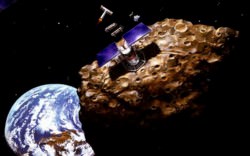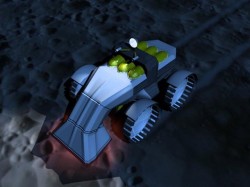It’s been said that a single asteroid might be worth trillions of dollars in precious rare metals. Will we ever reach out and mine these space rocks? How hard could it be?
Here on Earth, precious metals like gold and silver are getting harder to find. Geologists are developing more elaborate ways to get at the veins of precious metals beneath the surface of the Earth. And for the truly rare metals, like platinum and iridium, forget about it. All the platinum ever mined in the history of the world would fit inside my basement, and it’s not that big of a basement.
There are asteroids out there, just floating past us, taunting us, containing mountains of precious minerals. There are iron-nickel asteroids made entirely of metal. Comets of water, dirt and organic materials, everything you’d need to make an orbital farm. Just a single 30-meter asteroid, like the recently discovered 2012 DA14, is worth $20 trillion dollars. Now, if you could just somehow get to it.
Mining here on Earth is hard enough, but actually harvesting material from asteroids in the Solar System sounds almost impossible. But almost impossible, is still possible. With enough ingenuity and a few breakthroughs in spaceflight and robotics, plus some convenient hand waving for the sake of storytelling and there could be a future of asteroid mining ahead of us.
If there are mineral rich asteroids that contain a large amount of precious elements, it just might be cost effective to deliver those elements back to Earth. $20 trillion dollars sure would help buy that space elevator you wanted for sci-fi Christmas. If we had Robotic harvesters extract the gold, platinum and iridium off the surface of the space rock and they could send return capsules to Earth.
It would make even more sense to keep this stuff in space. Future spacecraft will need rocket fuel, hydrogen and oxygen, conveniently contained in water. If you could mine water ice off a comet or asteroid, you could create fuel depots across the Solar System.

Miners could extract and concentrate other materials needed for spaceflight and return them to Earth orbit. There could eventually be an orbiting collection of everything you need to survive in space, all gathered together and conveniently located … in space.
You might be surprised to know that getting to a nearby asteroid would require less energy than traveling to the Moon. Asteroids actually make better refueling stations than the Moon, and could serve as a waypoint to the other planets.
There are a few companies working to mine asteroids right now. Planetary Resources and Deep Space Industries have both developed plans for robotic missions to find asteroid targets, analyze them up close, and even return samples to Earth for study.

Within a few decades, they should have identified some ideal candidate asteroids for mining, and we get on with the work of mining with Solar System to support our further exploration. Perhaps then we’ll become a true spacefaring civilization, or just get conquered by an uprising of our sentient robotic miner drones.
So, will this ever happen? Will we eventually mine asteroids to send material back to Earth and support the exploration of space? Who knows. Business and industry are drivers of innovation. If there’s profit to be made, somebody will figure out how to do it.
What do you think? Do you envision a future career as an asteroid miner? Can we all be like Bruce Willis? Tell us in the comments below.
Thanks for watching! Never miss an episode by clicking subscribe. Our Patreon community is the reason these shows happen. We’d like to thank:
From Quarks to Quasars
Dark Matter is the New Black
and the rest of the members who support us in making great space and astronomy content.
Members get advance access to episodes, extras, contests, and other shenanigans with Jay, myself and the rest of the team.Want to get in on the action? Click here.


Pricing an asteroid at $20 trillion is unrealistic. Prices are based on supply and demand; if supply increases because asteroids become available, prices will drop drastically. Check what happened to gold and silver prices in Europe after Spain started bringing treasure galleons with precious metals from South America and the Philippines.
First, it’s non-trivial to get all that gold down to earth intact, but hold that thought a moment… what shareholder would agree to spend billions, over decades, to develop off-Earth mining and processing capability, just to flood the market with cheap raw materials? The 16th century Spaniards were ignorant of the economics of their behavior. Today the bottom line is heavily guarded. Value comes from mining and processing in space–for use in space–where it could sell for multiples of Earth price but still at a fraction of rocket-launch costs. It adds value, is profitable, because it opens up new opportunities for development off-Earth. It’s not really about mining, it’s about economics and a new marketplace.
Right now there’s no demand. Even if we had stockpiles sitting at L2 we’re decades away from being able to use it, and conversely, no one will mine and process a pile of materials with no buyers and no way to use it. This will be a lock-step development, starting small and building capacity with demand…in space, for the reasons stated above.
The first asteroid would be a bonanza . . . that is enough to draw the interest and technology . . . . capitalism and greed will do the rest.
NASA plans to send astronauts to an unspecified asteroid by 2025
How will the spacecraft carry them is a question still in the open; an asteroid’s gravity is too weak to hold a lander. Inspired by fishermen and hikers MIT researchers are investigating techniques for projectile launches into the rock to stabilize spacecraft with cables. Artificial gravity is created by the astronauts. Projectiles are customized for each target . ”Some asteroids might have a metallic core, and trying to anchor them would be like banging a nail into an anvil,” says Jeffrey Hoffman, a former astronaut and professor of aeronautics and astronautics at MIT. ”Others may just be a rubble pile, which would be like trying to pitch a tent on a snowfield” Astronauts could also use these docking techniques on the moons of Mars-which the Obama administration has endorsed-because of their similarly weak surface gravity.
Key here might be developing or improving low cost/high grade spectroscopy devices for amateur astronomers with quality large scopes?
What happens if someone discovers an asteroid with say a pure platinum spectral signature? Does the discoverer get a share? Could we use that idea to generate interest in asteroid classification programs or efforts?
If we wanted to land on a metal rich Asteroid we would not need to (bang a nail into an anvil) We could use Magnets to hold the ship down then re direct it to a Dessert or an Isolated spot on Earth then mine it on Earth :)…We will definitely mine in the Future
“…then re direct it to a Dessert or an Isolated spot on Earth then mine it on Earth :)…”
There’s no such thing as dropping an asteroid gently to the Earth to mine it on the ground. The relative velocities and masses involved are extreme. The Chelyabinsk meteor was an asteroid 20m in diameter and about 12,000 tonnes; granted it was traveling at 60,000km/h, but even at 20,000km/h and half the size re-entry is going to be catastrophic. To say nothing of the energy require to bump it out of whatever orbit it’s currently in to begin with.
There’s actually a name for this: Orbital Bombardment.
sounds a bit like “Star ship Troopers”. I’m very, veeeeery glad our local religious fanatics don’t have the knowledge, technique and money to start the terror from space… they would do it without thinking twice.
This paper describes approach with, in my opinion, best chances of success, using ISRO, additive manufacturing and plenty of robots in the first stage :
“Affordable , rapid bootstrapping of space industry and solar system civilization”
http://data.spaceappschallenge.org/aerospace.pdf
They use the Moon, but i think asteroids are better. They don’t need wasteful chemical engines for landing and take-off, but can move around with high Isp electric propulsion.
Putting elevator on the Moon would change equation, of course, as would anything else, like rail launcher, but to mine asteroids one doesn’t need to put anything anywhere, just processing plant somewhere out of gravity well, depending on logistics requirements for it’s outputs.
I remember costs for such operation being favourably compared to the costs of starting mining extraction back at home, hand-wavy 2-3 B$.
Luckily, we don’t need to wait for national agencies to wake up.
Yes, i’d like to have my tiny little asteroid, with flower for company and have 10 sunsets per day, if i wanted, (https://en.wikipedia.org/wiki/The_Little_Prince ) but for now i have to settle for things like :
Firefly Online
https://keepflying.com/
Another 20 years ..
It is also worth bearing in mind that the potential range of elements available in asteroids is likely to be somewhat limited. The formation of many of the mineral deposits on Earth involves the presence of water at some stage in the process to concentrate or transport the elements in question (and more complex crustal processes like plate tectonics are also important to drive many of these mineral systems). Although there may be other processes that have taken place in asteroids to concentrate some elements, I would imagine that the range of potentially economic elements is still quite restricted. The Earth is a pretty special place!
The idea that AI will eventually overcome humans is an unlikely scenario. Given that humans will integrate with computers, I see the doomsday idea as quite implausible. The idea that humans will mine asteroids? If we manage to not nuke ourselves out of existance, it will surely happen.
Fraser doesn’t like my comments, too close for comfort ?
I’ll put forward another hypothesis about (auto) moderation :
– i was clumsy enough to include references with web addresses for my ‘extraordinary’ claims and i’ll assume Mr Fraser is busy with other things than reading spam in the comments. Evidence, as much as i can see, is in accord with this conclusion, twisting my ear, taking note.